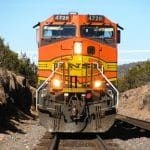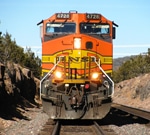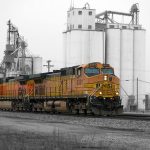
Tag: BNSF

Read the entire article here.

Read the entire article here.

According to BNSF, the furloughs are the result of customer volumes decreasing. Read the complete article here.
NewsmaxFinance.com reported that Warren Buffett’s BNSF railroad, owned by Berkshire Hathaway Inc., may offer a competing bid for Norfolk Southern Corp, throwing a wrench in Canadian Pacific Railway’s efforts for a $27 billion takeover of Norfolk Southern.
Read the complete article here.
Railroad has tentatively agreed to pay $71,700 for faililng to timely report leaks of crude oil along the state’s railway system

Read more from The Seattle Times.

According to one BNSF employee who contacted the Pilot, the company has imposed a new method of operation that has employees working 12-hour days, sometimes six to 10 days in a row.
“Such a safety sensitive job for engineers and conductors running trains that are up to 17,000 tons, hauling hazardous materials and such,” said the employee who declined to be publicly identified.
Read more from Bakken.com.
What is believed to be the largest frac sand unit train to date in North America was recently delivered by BNSF and Southwestern Railroad to Rangeland Energy’s RIO Hub near Loving, N.Mex. The RIO Hub is part of Rangeland’s RIO System, which serves oil and gas producers in the Delaware Basin.
The 150-car unit train, operated by BNSF, carried 16,500 tons of frac sand used in hydraulic fracturing (“fracking”). Powered by five locomotives it originated in Ottawa, Ill., BNSF handed the train off to short line Southwestern Railroad at Clovis, N.Mex., for delivery to the RIO Hub.
The unit train arrived on Oct. 2 and was unloaded within 22 hours. The sand was stored at the RIO Hub and will supply an operator with a large quantity of sand for high-volume fracking jobs in the Delaware Basin.
Read more from RailwayAge.

After this year, Fort Worth-based BNSF Railway will be more than 99 percent finished with a second, parallel line to its 2,200-mile Los Angeles-to-Chicago route. Doubling up will create a rail superhighway speeding deliveries of toys, electronics, autos and other goods, because trains won’t have to yield to each other on sidings as they do on single tracks.
The goal: help the unit of Buffett’s Berkshire Hathaway, which owns BNSF, grab cargo now going by road.

There’s been a recent effort to invest in railroad infrastructure statewide, thanks in part to a push from political delegates at the federal level. At the same time, many companies are adding grain storage facilities and other upgrades to make for a smooth harvest season at the elevators this year.
What is perhaps the state’s largest grain storage facility will be fully operational for this season in Emery, S.D. Last year, Cargill built a 5.2 million-bushel grain storage facility just south of town. The conveyor system wasn’t ready for harvest season last fall, but Cargill still used the building for storage, filling it to about half capacity with portable conveyers.
Read more from Tri-State Neighbor.